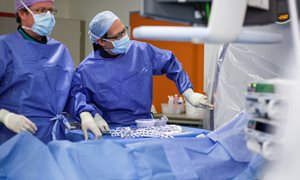
When prostate cancer is suspected, a small piece of prostate tissue is taken for further examination. This procedure is called a prostate biopsy. Prostate biopsy can lead to infections caused by intestinal bacteria, for which patients are given an antibiotic preventively. The number of infections decreases further when the antibiotic is tailored to the patient. This is shown in research from Radboud university medical center.
To determine if patients have prostate cancer a prostate biopsy is performed, in which small pieces of tissue are taken from the prostate. During such a biopsy, the doctor usually punctures the prostate through the intestine. During the procedure, intestinal bacteria can be transferred to the prostate and from there spread further, which can cause infections of the prostate, urinary tract or bloodstream. To prevent infection, patients are given the antibiotic ciprofloxacin preventively. But this drug does not work in all patients because intestinal bacteria have become increasingly insensitive (resistant) to it. As a result more patients get an infection after prostate biopsy, putting them at risk for serious illness. It can lead to sepsis, hospitalization and, in rare cases, death.
Researchers at Radboud university medical center therefore wanted to determine whether it is better to prescribe culture-based prophylaxis for patients whose gut bacteria are resistant to the usual prophylaxis. This turned out to be the case, says physician-researcher Sofie Tops: "One group of patients received the standard prophylaxis with ciprofloxacin. In the other group, we investigated who had intestinal bacteria that were insensitive to this drug. Those patients received another antibiotic based on the results of a rectal culture. In this second group we found 2.5% infections within seven days after biopsy, in the group with the standard prophylaxis 4.3%.
Chance of infection
When the researchers looked only at the group that received the standard antibiotic, a clear difference also emerged. There, 14.7% of men with insensitive gut bacteria got an infection, versus 2.4% of men with sensitive gut bacteria. This means that patients with insensitive gut bacteria who received the standard antibiotic were six times more likely to get an infection after prostate biopsy than patients with sensitive gut bacteria. A big difference, agrees Tops. "This shows that culture-based prophylaxis can contribute to fewer infections after prostate biopsy.
Yet still some of the patients who received tailored antibiotics developed an infection. Tops and her colleagues suspect this is due to the amount of bacteria present in the intestine. 'But there is another way to lower the risk of infection. It has been proven effective to disinfect the gut with iodine prior to the examination. We don't do that enough. If we combine this with culture-based prophylaxis, the risk may drop even further. This is important not only in the Netherlands, but also in the rest of the world, where antibiotic resistance is a major problem in some parts.’
About the publication
This article was published in Clinical Infectious Diseases: Rectal culture-based versus empirical antibiotic prophylaxis to prevent infectious complications in men undergoing transrectal prostate biopsy: a randomized, non-blinded multicenter trial - Sofie CM Tops, Eva Kolwijck, Evert L Koldewijn, Diederik M Somford, Filip JM Delaere, Menno A van Leeuwen, Anthonius J Breeuwsma, Thijn F de Vocht, Hans JHP Broos, Rob A Schipper, Martijn G Steffens, Steven Teerenstra, Marjolijn CA Wegdam-Blans, Els de Brauwer, Wouter van den Bijllaardt, Alexander CAP Leenders, JP Michiel Sedelaar, Heiman FL Wertheim.
-
Want to know more about these subjects? Click on the buttons below for more news.
More information
Pauline Dekhuijzen

wetenschaps- en persvoorlichter





